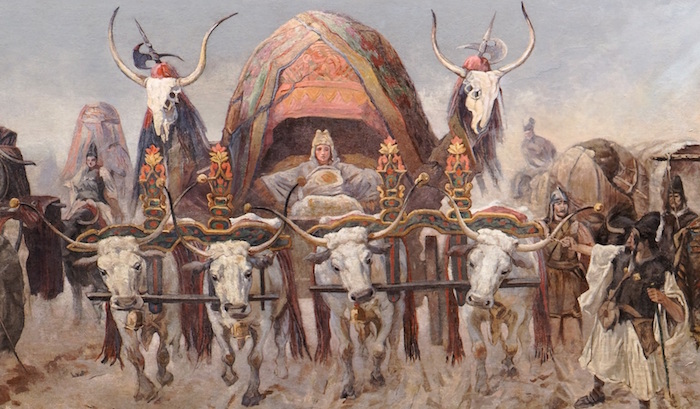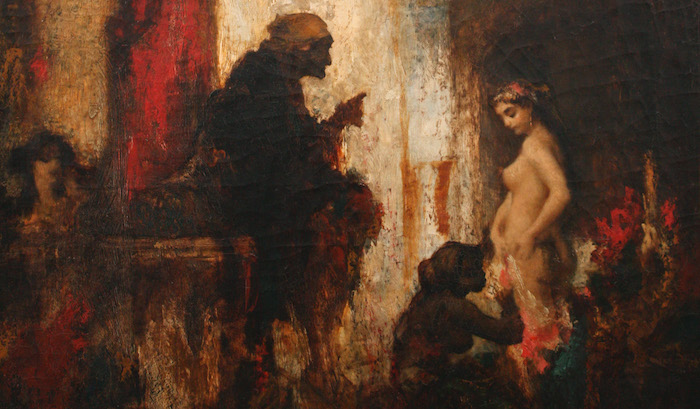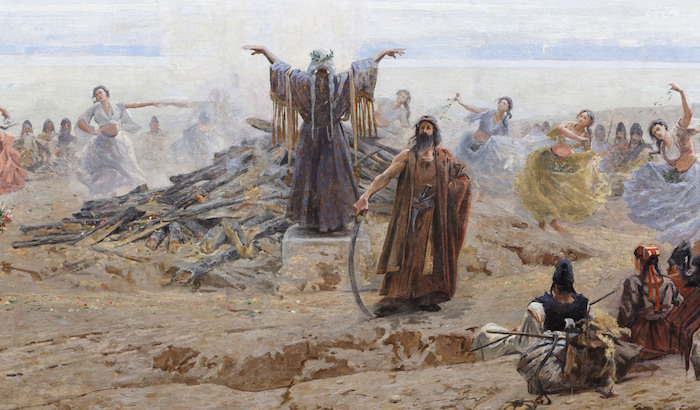European folklore is full of odd characters that are neither truly hero nor villain. These characters can make wonderful supporting NPCs for an ongoing fantasy campaign. We’ll look at five: a wizard who weighs virtue, an assassin with poisonous skin, a doctor who can rewrite personalities, a magician with a dangerous sense of humor, and a ragged hanger-on who’s much more than he appears.

We start with the garbonciás, a weather wizard from Hungarian tradition. If you knew what you were looking for, you could always spot a garbonciás. He dressed in a black cloak and a black hat, and carried a large, leather-bound book. Reading aloud from the book powered his spells. One page allowed him to teleport long distances. Others revealed buried treasure, broke wicked enchantments, summoned water dragons, and even commanded giants! The heart of his power was weather control: summoning and dismissing storms, hail, rain, and snow.
To become a garbonciás, you had to travel to far-off Italy and learn thirteen obscure subjects. Then you and thirteen other students sat on a wheel of fortune balanced over a deep, dark pit. The wheel spun and spun until one of you fell off. His soul went straight to the Devil. The magic in the survivors’ books came from this sacrifice. Despite this association with the Devil, garbonciás were fundamentally good – but no one ever entirely trusted them.
The logical place for your party to encounter a garbonciás is on the road. These wizards traveled alone from town to town testing people’s virtue. A garbonciás would stop outside houses and ask the strangers within for bread and milk. If they showed charity to the weary traveler, he blessed them with health, good fortune, and bountiful crops. If they turned him away, he cursed them with the opposite. PCs who bump into a garbonciás on the road may receive a similar test. And if they strike up a friendship with the black-cloaked wizard, he may pop in on them again later in the campaign to help out when they’re in a fix.

Our next NPC comes from the wild world of the Alexander Romance: Medieval tall tales starring Alexander the Great! This one is set when Alexander had just reached India. The queen of India wanted to mollify this dangerous foreigner, so she sent him gifts. But one of the gifts was a trap!
The queen of India sent Alexander a poison maiden. This was a woman raised from birth on a diet of serpents’ venom and poisonous plants. Dining only on poisons her whole life didn’t just make her immune to them. It turned her very flesh toxic! The queen dressed the poison maiden in silks and jewels and sent her to the Greek camp.
Alexander was going to kiss the woman when his aged tutor, Aristotle, intervened. Aristotle had heard of poison maidens and feared this woman might be one. So they summoned a condemned prisoner and had him kiss her. He immediately shriveled up and died. Alexander very politely returned his gift to the queen of India.
The poison maiden fits the theme of the femme fatale. It’s a trope that can be gross and sexist if handled badly, but a lot of fun if handled well. Know yourself and know your group. All that said, the idea of an NPC whose skin is death even to touch is a lot of fun! And there’s no reason you have to use him or her as an assassin. Such an NPC might be escaping from the profession they were born into. They might be a valuable source of information about the most devious workings of the court. Win, lose, or draw, it’s a great way to adapt the X-Men character Rogue into a fantasy world!

Next, we have a Hungarian folktale about whether it is better to care too much or not at all.
Long ago, the Black King had only one son, his sole heir. He was a good enough lad, but his heart overflowed with so much sympathy it perturbed his father. If the prince saw an old beggar, a wounded animal, or a sick child, he’d cry and cry for days. The Black King worried his soft-hearted son wouldn’t be able to face the hard decisions a king must make. Then one day a foreign doctor came to court and offered to make the boy ‘a real man’ with his medicines. The Black King agreed.
The doctor cut out the prince’s heart and put a new, hard heart in its place. And the boy was an entirely new person! Now when he saw an old beggar, a wounded animal, or a sick child, he’d kick them until they crawled out of his way. He was heard-hearted all right, but cold and cruel. The Black King begged the doctor to reverse the changes, but received only this reply: “Alas, highness, you can put a new heart in the place of the old one, but you can never get the old one back.”
The doctor is an amazing NPC. Having him running around your campaign setting surgically altering the personalities of other NPCs can be an interesting way to shake things up. He makes some of the PCs’ allies indifferent to them, and makes some enemies allies. The people the party was counting on become unreliable, and the feckless become reckless. The doctor isn’t evil per se (everyone who undergoes one of his procedures does so voluntarily), but he’s certainly causing trouble. How do the PCs respond?

Detail of Arrival of the Hungarians by Árpád Feszty (early 1890s).
The Italian folkloric antihero Pietro Bialardo was too delightful not to include: a rogueish, ne’er-do-well wizard. Even as a child, Pietro was always getting up to mischief. When young Pietro’s tutor left him unsupervised, the troublemaker naturally poked around where he wasn’t supposed to be. In the tutor’s library, the boy stumbled upon an ancient book of magic. For once in his life, Pietro applied himself to his studies, and soon his aggravating pranks were augmented by sorcery! Worst of all, he had a particular talent for commanding fire.
Once Pietro taught himself wizardry, there was no stopping him. When his first love rejected him, she was found two days later on a mountainside surrounded by an unextinguishable ring of fire. When Pietro was thrown in prison for starting a fight in a tavern, he blew a hole in the wall of the jail and escaped in a flying boat with all the other prisoners – except one old man the magician paid to stay behind and report what he’d done. When the blue sorceress of Lake Scanno left Pietro for another lover, the wizard hoodwinked the people of Rome into tearing down her palace. He never hurt anybody, but he certainly didn’t make many friends.
Once, Pietro summoned a demon to take him to Hell just to see if the place really existed. It did, and this worried the magician, for her knew he wasn’t likely bound for heaven. So he asked the Roman curia what he should do. They told him to make a pilgrimage to take mass in Rome, Paris, and Constantinople. Never one for long walks, Pietro summoned demons to take him to all three cities in a single night. That, of course, was even worse than not attending the masses at all.
As a recurring NPC, Pietro Bialardo will likely be popular with your PCs. If they need help with magical knowledge (or just some extra firepower), he may well lend a hand if they help him out with one of his spectacular pranks. But be careful! If the PCs anger or bore him, they may wind up on the wrong end of one of Pietro’s escapades.

Detail of Arrival of the Hungarians by Árpád Feszty (early 1890s).
We close with our third and final Hungarian folktale, that of the extraordinary shaman Kampó Táltos. A ’táltos’ is a shaman in the Hungarian folk tradition, and Kampó certainly exhibits a range of magical powers. For most of his life, he hung around at court, mooching off the king and dirtying the place up with his ragged clothes and ugly face. As you might imagine, he wasn’t popular with the queen or most of the nobles. But King Mátyás the Wise knew Kampó’s importance and kept him around despite everyone’s complaints. Ultimately, Kampó perished single-handedly saving the city of Szeged from an Ottoman invasion.
Kampó had an array of supernatural abilities. Some were fairly trivial: he was supernaturally cold to the touch and could open his mouth wider than he was tall. Others made him a terror on the battlefield: he could breathe fire, move faster than the eye could see, and was invulnerable. For all his other magical needs, he had a band of fairy retainers to help him out. Indeed, he was so capable that the only way the Turks could defeat him was to sneak up on him while he was sleeping and cut off his head, which is precisely what they did.
Slovenly, ugly Kampó Táltos is a welcome addition to any court. He provides a relatable figure (someone to talk to) for PCs who are too rough around the edges to talk to the aristocrats. He’s a valuable ally to cultivate and a terrible man to offend. Plus, just by being visibly out of place (and therefore different) he’ll be interesting in any court setting. If your players latch onto Kampó Táltos, he could easily pop up in the same sorts of crises and hot spots that PCs are naturally drawn to!
–
Source: Tales of Superhuman Powers: 55 Traditional Stories from Around the World by Csenge Virág Zalka (2013)






